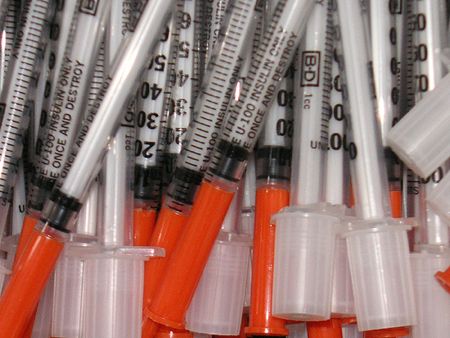Recently, a popular Ukrainian internet website Ukrayinska Pravda [ru] published a lengthy article criticising opioid replacement therapy (ORT) programs. The article led to a huge discussion among readers on whether or not Ukraine needs harm reduction programs.
The author of the article, journalist Yuriy Potashniy argued that the promotion of the opiate replacement therapy is actually an attempt by pharmaceutical corporations to take up the drug market. He considered substitution therapy to be a form of drug legalization, when criminal drugs are replaced with medical ones. Another issue that the journalist raised was the funding problem. As for now, harm reduction programs are implemented with the financial support of the Global Fund to Fight AIDS, Tuberculosis, and Malaria, but in the future they would become a burden for the Ukrainian state budget. According to Mr. Potashniy, in most of the countries the Methadone programs have been cut back because Methadone has been proven to be even more harmful and caused more deaths than heroin.
Among the 146 comments posted by the readers, there were voices who shared the opinion of the author, as well as those who strongly disagreed with him.
The reader “duty” pointed out that despite of some negative consequences, substitution therapy programs have many positive features which were totally ignored in the article. The reader wrote:
Я повністю підтримую ЗПТ, й якраз з позиції зменшення шкоди… для здорової частини суспільства:
1. ЗПТ дозволяє (певною) декриміналізувати наркоманію, надавши легальне джерело безкоштовного наркотику; таким чином виводячи наркозалежного з кримінальної сфери;
2. ЗПТ дозволяє не роботи ін”єкцій, отже зменшується ризик поширення специфічних інфекцій зараженим наркозалежним або його інфікування;
3. ЗПТ дозволяє певною мірою контролювати та обмежувати повсякденну поведінку наркозалежного (це називається ре-соціалізація).
[…]…(ЗПТ) не призначають здоровим людям. Пацієнти ЗПТ ВЖЕ приймають наркотики
I fully support the ORT programs, as they allow for reducing harm …for the healthy part of the society:
- ORT helps to decriminalize drug addiction by providing the opportunity to legally receive drugs free-of-charge, thus, taking a drug user away from a criminal sphere;
- ORT allows (to some extent) to stop the injection of drugs, thus, reducing the risk of spreading out of infections which are typical for drug users;
- ORT allows (to some extent) to control and to limit the behavior of a drug user (it is called re-socialization)
[…]
…ORT is not – prescribed to healthy people. ORT patients are ALREADY drug users…
The reader “viliam3″ supported the position of the author of the article. The reader's idea was that because it was a personal choice of people to start using drugs, then they have to bare full responsibility for the consequences. He posted:
Товарищи наркоманы, бывшие, настоящие, “лечащиеся” на ЗПТ! Вы когда начинали нюхать-колоться и далее воровать, вести асоциальный образ жизни – так Вы ни минуты не думали, что это может привести Вашу жизнь в пропасть?!? Тогда Вам было нормально, все шло путем, а сейчас с пеной у рта доказывают какие они болящие, им бедолагам нужен метадончик, не закрывайте наши ЗПТ…тьфу! ВЫ САМИ СЕБЕ СОЗДАЛИ ТАКУЮ ЖИЗНЬ!
In contrast, a reader “Victoria21″, opposes substitution therapy programs for their lack of a humanistic approach. She is concerned that Methadone treatment does not lead to full rehabilitation from drug addiction. She wrote:
И самое опасное во всем этом , что больному человеку не оставляется шанса на выздоровление, так как срок лечения метадоном – пожизненно, при этом длительность жизни резко укорачивается.
[…]
P.S Дорогие врачи! Помните что вы давали клятву помогать людям, а не губить их, раздавая наркотики под видом лекарства!
The most dangerous part is that the sick person does not have any chance for recovery, as the treatment by Methadone lasts for one's entire life, meanwhile the life of the patient is reducing significantly.
[…]
P.S. Dear doctors! Remember that you took the Hippocratic Oath to help people, but not to harm them by giving out the drugs in the guise of treatment.
The reader Yevgeniy Selin was among ORT supporters. He questioned Mr. Potashniy's statement concerning the reduction of the substitution therapy programs in the world and commented on the financial implications of harm reduction programs. He wrote:
Люди противники ЗПТ , как вы не можите понять то ,что программы Заместительной терапии входят в принятые по всему миру программы Снижение вреда от наркотиков рекомендованные Всемирной организацией здравоохранения и ООН работают они почти по всему миру включая такие страны где до недавнего времени были наказания за употребление в виде тюрьмы но эти страны как Иран и Китай поняли что так бороться с наркотиками нельзя, … наркозависимый обходится всего в 7 $ в месяц государству при программах ЗТ , а если человек употребляет наркотики то вреда от него в десятки раз больше : их нужно содержать в тюрьмах, лечить от кучи болезней которые они переносят еще и обычным гражданам (туберкулез, ВИЧ , гепатиты ), содержать целую армию милиции которой нужно платить зарплату …
The leader of the Rising Voices grantee project the Drop-in-Center, Pavel Kutsev commented on this article in his blog [ru]. He noted that the huge online discussion in the comments section of the article is a good indicator of a positive impact of ORT, since now people living with drug addiction are involved in civil society and advocating for their rights. He wrote:
Я бы ограничился отметкой факта повышения, очевидного повышения интерактивности защитников ЗПТ, как правило, состоящих из прогрессивных специалистов и людей, живущих с наркозависимостью, что само по себе является наилучшей иллюстрацией несомненной пользы заметстительной терапии – именно благодаря ЗПТ .. в стране наблюдается … активизация представителей гражданских сообществ (ещё недавно маргинальных)…




